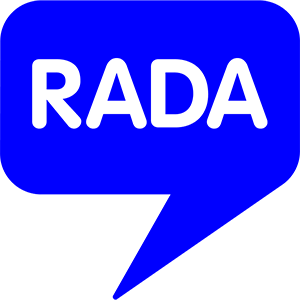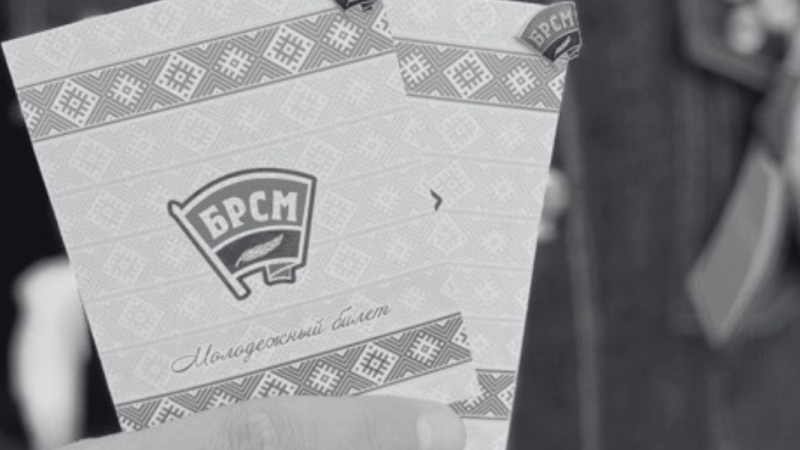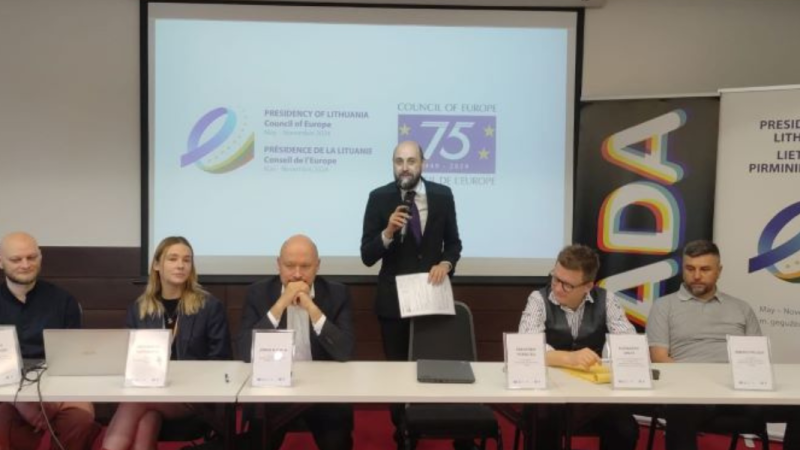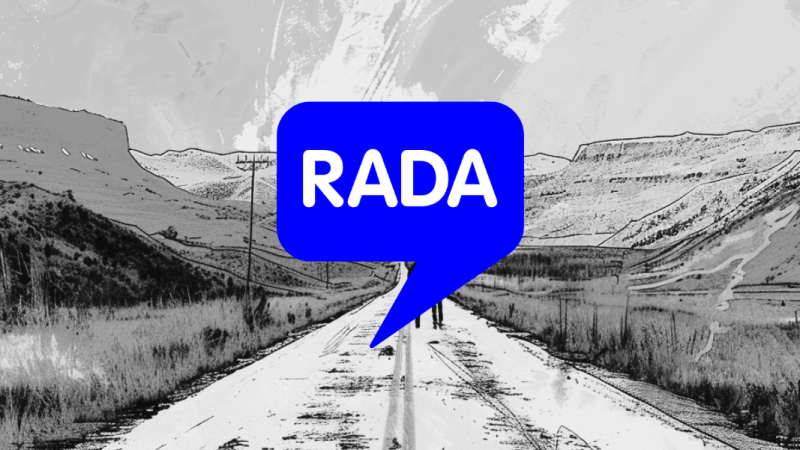Playing the long game for democracy

The National Youth Council of Belarus, Rada represents 32 youth associations. In a dictatorship that systematically suppresses independent civil society, running an organisation is hard work. As a follow-up for JEF’s Democracy Under Pressure campaign, The New Federalist spoke with Zmicer, Policy Officer of Rada.
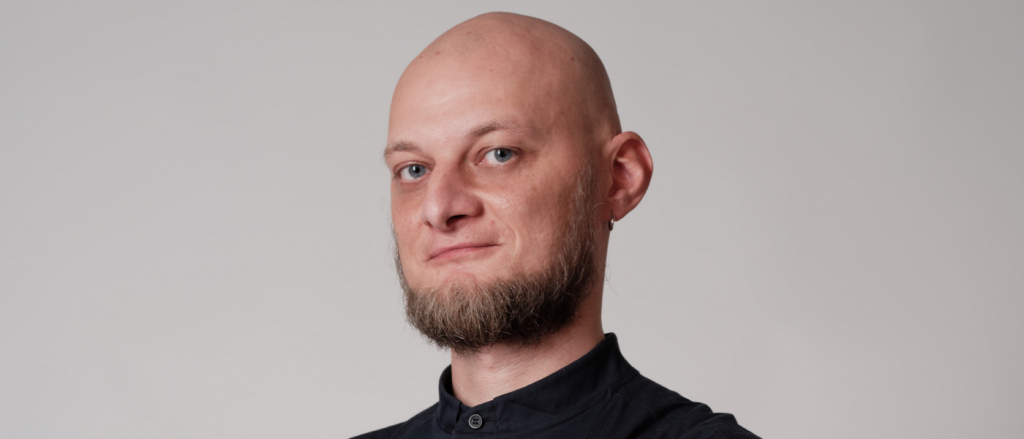
The New Federalist: After the manipulated August 2020 presidential election, we saw big street protests in Belarus. Since then, it seems that the pro-democratic movement has adjusted its strategies. What are the main goals of the movement at the moment?
Rada: In Belarus, we have two types of civic movements: those who were present earlier, and those who awakened in 2020. Rada was liquidated in 2006 and lost its registered status, after which we had to operate underground. However, the work has nonetheless been systematic.
Those who had been active before 2020 had good experience, and they know what works and what doesn’t. What they lacked were the numbers. Then, we had the new wave of people awakening in 2020. It started with [President Aliaksandr] Lukashenka’s blindness to the COVID pandemic. People were puzzled by his ridiculous statements about curing COVID with vodka, sauna and tractors, and by his lack of support for medical workers who were at the frontline of the pandemic.
People created voluntary groups to get protective equipment for medical workers, and to decrease the risk of elderly people catching COVID. People felt the urge to help each other. So in the summer, becoming active came naturally to people: they felt the need to be useful, and transformed this into a political campaign.
Meanwhile, after the election, the protests were peaceful but the police used guns, so people sensed the injustice. Many of those who were awakened in 2020 attended their first public rallies: they had never for example participated in Freedom Day rallies on 25 March, or in Chernobyl remembrance day marches on 26 April.
We saw that these newly awakened activists had a lot of energy, but didn’t know how to use it in a systematic way. This sometimes sparked conflict: we would hear things like “don’t teach us because you haven’t reached any results in 15 years”, to which we would respond, “you can try to reinvent the wheel, but you can always come back to us”.
So we as the “old civil society” are providing educational programmes. We are trying to narrow this gap, but sometimes we don’t have the necessary resources. Another issue is that for example [the Rada President] and myself are not in Belarus anymore, so we also have this geographical gap.
The New Federalist: Over time, have the “newly awakened” activists taken up these programmes more readily?
The newcomers want to gain the skills for defeating Lukashenka. What we say is that there is the long story and the short story, and we’re here to talk about the long story. Since 1997 already, Rada has been bringing the democratic alternative for Belarus. When we tell this history to people who come from the activist movement, sometimes they don’t want to hear about it.
We have some “hook” programmes, providing soft skills such as public speaking and building team dynamics. This is exactly what the activists want, so we started providing it, but before 2020 we didn’t have any of this. Of course, we understood that we cannot leave the needs of these awakened Belarusians unaddressed.
For example, we had six workshops on creating visual products: using tools like Canva and Photoshop, learning how to make a good poster for your event. This was available for people from organisations, but also for people who are not representing any group. We try to mix these two types of groups.
If activists apply for the trainings, we check with them whether they represent a group or as a single person. For example a single person doesn’t need project management skills. However, if they represent even an informal group, that is okay for us. For example, even among our 32 member associations, we have groups that work as informal initiatives.
The New Federalist: As you mentioned, Rada operates “underground”. Can you give examples of what this means in practice?
Rada: Imagine a country where you face up to two years in prison for acting on behalf of an “unregistered organisation”. You don’t need to imagine it, as that country is Belarus. There used to be lenience on this, and you would just get an administrative fine, but this is no longer the case. This means that first of all, you need some courage to take part.
We never disclose who is in our network, we never give the contacts of our member organisations. We only use our corporate emails for our Rada work, and for example don’t use our personal email addresses for signing up for mailing lists. We also auto-delete our Telegram messages.
We are continuing our work, and it’s not only for survival but also for increasing the capacity of young people. This is why we offer training for activists. For example, we offer an “organisational clinic” that connects associations with experts who can help with developing their internal structures.
Inside Belarus we are hidden, but outside the country we are public. We raise awareness to the world about human rights and other abuses in Belarus. For example, in January we provided a report for the United Nations ECOSOC Council. We also created an alternative report on youth rights in Belarus. This started when the Belarusian government made a report on Sustainable Development Goals and for example, claimed that there is full gender equality in Belarus, even though we still have a list of occupations that are forbidden for women.
This is why it’s important that we show to the world what is really happening in Belarus. Those who are outside the country are quite free to speak and engage in activities, but of course we don’t want to endanger people who are inside Belarus.
The New Federalist: How has the war in Ukraine impacted the realities of civic activism in Belarus?
Rada: In the first three weeks of the Russian invasion, we worked 24/7 to collect information in English on how to leave Ukraine, and shared an information pack through the European Youth Forum network.For instance,, there were 40,000 Turkish students in Ukraine before the war started. There were a tremendous number of people who had no information about safe routes for leaving.
With activists who had moved to Ukraine, we also provided a humanitarian corridor. For instance, in the first days of the war, it was not easy for the people to cross the border from Ukraine to Poland. We collected people’s passport details and sent them to the Polish government, so that people would be allowed to pass.
Many Belarusian activists had fled to Ukraine before the war. A big number of people had to leave the country again: first they had left Belarus, now they had to leave Ukraine. It’s also a big disruption to the work of organisations. For example, there is a youth and media organisation that had moved to Ukraine, and had regained capacity to provide some educational opportunities. Now, due to the war, these are cancelled.
The worst thing we have experienced is discrimination against Belarusians. People have been leaving the country since 2020 precisely because they opposed Lukashenka, and now some are claiming that these Belarusians in Ukraine or other countries are supporting the war: where do they get this from? We started a feedback form where people can report on discrimination, and we received over 150 responses. This includes people who lost their jobs, or were rejected from scholarship programmes. For example, we helped a Belarusian student in Lithuania by contacting the Lithuanian Ombudsman, and by working with the Lithuanian Youth Council. Of course, if this kind of discrimination becomes a more common problem, our resources won’t be enough.
The New Federalist: What could NGOs in democratic countries learn from you?
Rada: One thing is flexibility: in a context like ours, you need to be ready to adapt to new circumstances. We can also teach you how to make a shadow report on anything that your government is doing!
Secondly, what is important is staying in touch with youth from this region to understand how different the agenda is. For example, we cannot raise issues like the right to vote at age 16, because first we need to achieve basic things like rule of law in the country.
The New Federalist: How can people in other countries support Belarusian activists?
Rada: By staying in touch, sharing information, engaging in activities connected to Belarus in your city and your country. By reaching out to us, you can enable us to report to actors in different countries on what is happening in Belarus.
Secondly, you should bear in mind that Belarusian people don’t support the war in Ukraine, they never did, and never will. Any discrimination against Belarusians has to stop.
The New Federalist: Finally, what should the EU do to improve the status of democracy and rule of law in Belarus in 2022?
Rada: Support international opportunities and exchanges for young people. We need opportunities for Belarusian youth to be ready for democratic change, for example to study in European universities.
We also need to collect information to ensure that those responsible for wrongdoings are held accountable once the change comes.
Source www.thenewfederalist.eu
